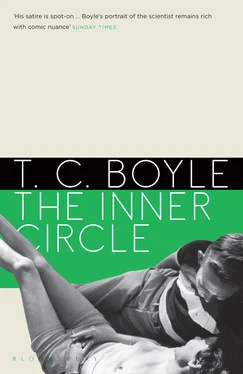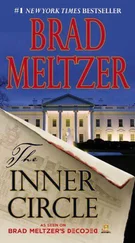The first film we made — of Corcoran and Betty, reprising their earlier roles — was the one I remember best. It was late in the year — the holidays were nearly on us, Prok dusting off his Santa Claus whiskers, Vivian Aubrey preparing to go off and visit her parents in Florida, my own mother appearing out of the blue to spend some time with her grandson — when Prok, with a hint of mystery in his voice, asked us to gather at his house that evening, sans wives, on Institute business. My mother didn’t understand. All through dinner she’d quizzed me about the project and Prok — When was she going to see Prok again? Such a nice man. So dedicated. What had I thought of his picture in such-and-such magazine? And Mac. Didn’t that photograph flatter her, because God knows she’s no beauty. I sliced meat and dipped the tines of my fork into a mound of mashed potatoes and assured her that Prok hadn’t changed at all (a lie) and that he talked of her often and fondly (another lie) and we’d see him at the Institute tomorrow, but that tonight’s meeting was strictly business and bound to be a bore.
Iris concurred. “You don’t want to go, Irene, believe me. It’ll just be Prok and his boys, heads down, worrying over the female orgasm.”
My mother gave me a look across the table, then turned to Iris. “But you’re not being fair, Iris, he’s such a—”
“—sweet and generous man?”
“That’s not what I was going to say, but, yes, I think he is. And a great man too. And John should feel privileged to be part of the whole undertaking. I’m very proud of you, John, I am.”
Iris dabbed at a blackish smear of strained spinach that had somehow migrated from John Jr.’s bib to his forehead. “Oh, yes, I know,” she said, her voice weary and saturated with sarcasm. “I count my blessings every day.”
And then it was off in the cold, the Dodge wheezing to life on the third try, headlights drilling the road all the way into town and out to Prok’s house, where the faerie cottage glittered with Christmas lights. I slammed out of the car, huddled against the cold, and hurried up the path to the house, hardly noticing the dark humps of the frost-killed flowerbeds and the forest of saplings that had begun to take hold in the neglected yard. I stood on the familiar doorstep and rang the bell.
Mac answered the door with a welcoming smile, and she was dressed up — and made up — as if she were going out to a concert or the theater, in a dress I’d never seen before and earrings in the shape of miniature jeweled Christmas trees. Her hair was newly permed. She was wearing lipstick. “John,” she breathed, “come in and welcome,” and I felt bad that I had nothing to offer her, not flowers or candy, not even a cheese.
“I don’t, well, I didn’t know this was a formal gathering, or I would have brought a cheese, at least.”
This was an old joke between us, and she laughed to show her delight in it. “No need for cheeses tonight. Prok’s made a Barbados punch specially for the occasion.” A pause. “And your mother — she’s well? And Iris? Good. Well, send them my love. And we’ll have them out to the house over the weekend, just us, just the girls. Will you tell them?”
She held my hand a moment too long, and I felt the pulse of all that had passed between us, the slow, sweet, soft heartbeat of those times, and then she led me into the living room.
The others were already gathered there, the erratic light of the fire distorting their features so that they looked like strangers in a crowded waiting room till I came close and all was familiar again, Hello, John. Good evening. Cold out there? A lamp was lit in the corner. The Christmas lights at the window winked on and off, fixed to a timer. There was a smell of woodsmoke, the oak and apple wood Prok liked to burn, and of the scented white candles Mac had set on the mantelpiece, everything cozy and festive. I greeted everyone in turn, but when I saw that Betty was there, lounging in the far corner and chatting casually with Corcoran, it gave me a jolt — something was up, and my interest was piqued, no doubt about it — so that I wound up presenting her with an awkward nod and a puzzled little half-formed smile before settling into a chair beside Rutledge and Prok. Betty acknowledged me with a smile that flickered across her lips and vacated her eyes before turning back to Corcoran, and I wondered what that meant. Did I feel a stab of jealousy, as ridiculous as that might seem? What had she said that night at the tavern— Purvis is a great friend of mine, you know that, don’t you? But wasn’t I a great friend of hers too?
“Is this alcoholic?” Aspinall was saying. He was stalled at the punch bowl, his shoulders slumped and head hanging, as if he were afraid of breaking something. “Ted?” Mac glided across the room to him. “Did you need some help? What about you, John?” she called. “Punch? Or something lighter — a soft drink maybe?”
And then I was clutching a cup of warm yuletide cheer, pressing it to the yielding strip of cartilage at the base of my nose until the alcoholic fumes began to soften the passageways there and the distinct voices of the room came clear to me. Prok was talking about San Quentin, the prison in California — we’d been invited to interview the prisoner population there, and he’d managed to set up some lectures at Berkeley as well. His voice was straining for modulation, riding up and down the emotional ladder — clearly he was excited at the prospect of going into a maximum-security prison to delve into the histories of some of the most dangerous men our society had to offer, the ne plus ultra of extreme cases, but shouldn’t we have been investigating the monasteries too? I smiled at the thought. Prok in a monastery. Imagine that. Mac’s voice came to me then, fluting and soft — the weather, that was her subject — and the buzz of Aspinall’s high-pitched rasp wrapping itself around it. I couldn’t hear what Betty and Corcoran were talking about, but I heard Betty’s laugh, the whole trajectory of it, rising up to fly out over the room like a dart descending to the bull’s-eye painted across my brow. We were going to witness living sex again, and we were going to film it. That was what was going on here. Corcoran and Betty. And why him? Why not me? What was wrong with me?
It was then that the lavatory door swung open and Vivian Aubrey stepped out to join the party. Her hair — blond, with a natural wave — had been freshly brushed, and she’d reapplied her lipstick, a blood-red dab of which was in evidence on one of her incisors when she smiled her way back into the room. She was elegant in the way of my first female subject — the soigné faculty wife who seemed as out of place in Indiana as a tropical bird, and who’d made me blush — and she’d come straight to us from the rarefied atmosphere of the East Coast. She was confident. Shining. Light-years ahead of any of us in terms of sophistication and savoir-vivre. “Oh, hi, John,” she said, gliding up to me and taking my hand in a firm, frank grip, “I wasn’t sure you’d make it, what with the baby and your mother-in-law — your mother-in-law’s still in town, isn’t that right?”
Every possibility seethed within me. My voice was a croak. “My mother.”
She’d bent now to light a cigarette, ignoring Prok’s acid look — she was on stage here and she could do what she liked. I watched her throw her head back and exhale. “Oh, yes, right: your mother. ”
I don’t really think I have to go into the details of the filming that night, because, as I’ve said, the novelty quickly wears off and the process of filming, observing, even participating, loses its initial frisson with time and repetition — one act is very like another, whether it’s observed in the flesh or preserved on celluloid. What was different about that night, though — what makes me recollect it now even after all the activity, and trials, that have succeeded it — was what Vivian said to me next. She said, “I hear we’re going to be partners tonight, you and I.”
Читать дальше












